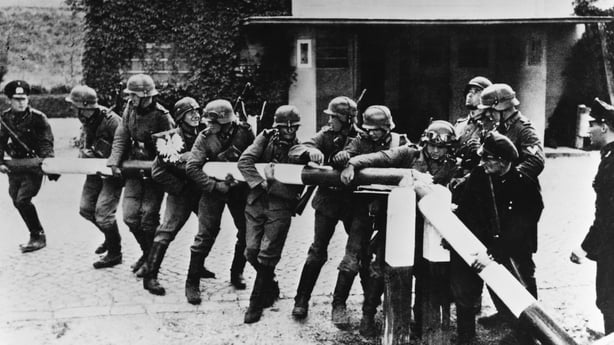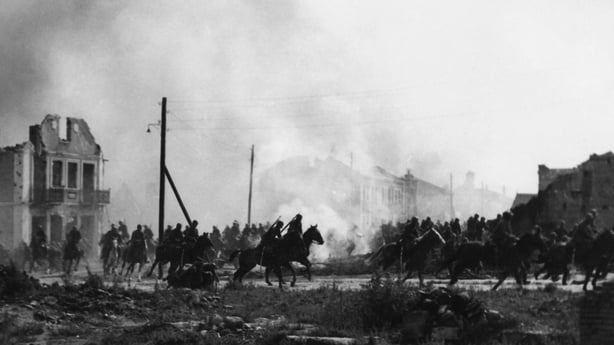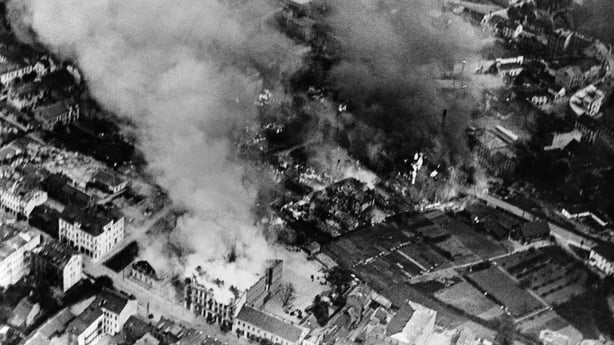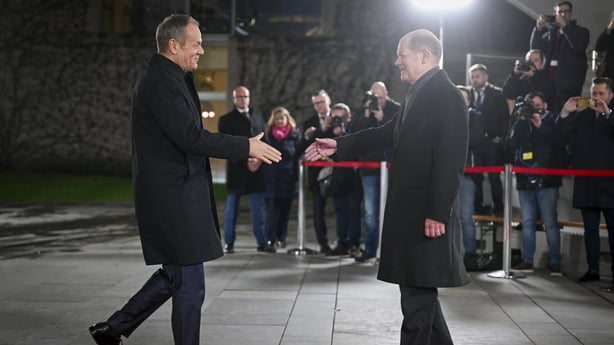Just before dawn broke this morning, Polish President Andrzej Duda took part in a ceremony in the western Polish town of Wieluń, to mark 85 years since Nazi Germany invaded Poland.
Wieluń, located just 20km from the pre-war Polish-German border, was the first Polish town to be bombed by the Luftwaffe at 4.40am on 1 September 1939.
70% of the town's buildings were destroyed. Of its 16,000 inhabitants, it is estimated that more than 1,000 were killed.
The Germans, said Mr Duda, had decided to "brutally crush Poles by attacking women and children. They knew perfectly well that they were bombing a city". Dozens of Polish cities were bombed that day.
Minutes after the attack on Wieluń started, at 4.45am, German warships and artillery began pounding the Westerplatte peninsula where a small garrison of Polish soldiers guarded the approach to Gdansk, then called Danzig.
We need your consent to load this rte-player contentWe use rte-player to manage extra content that can set cookies on your device and collect data about your activity. Please review their details and accept them to load the content.Manage Preferences
Vastly outnumbered, the Westerplatte's Polish defenders resisted repeated infantry assaults and aerial bombardments for a week until they were forced to surrender.
Such is the importance of 1 September 1939 in Polish history that it is customary for Polish leaders to attend dawn ceremonies at either Wieluń or the Westerplatte each year, marking the exact time when the invasion began. Polish Prime Minister Donald Tusk took part in this morning's ceremony at the Westerplatte.
The attacks of that day marked the start of World War II. On 3 September, Britain and France declared war on Germany.

But Poland had to fight it out alone. In 1939, neither the British nor French air force had the ability to fight an air war over Poland.
Germany's invasion destroyed large swathes of Polish towns and cities and inflicted mass civilian casualties.
Warsaw's ornate buildings burned.
Atrocities against civilians by the invading army were widespread.
The Polish army resisted ferociously for weeks and even mounted a large-scale counterattack in the second week of September.
But the Poles had a tenth of the number of tanks used by Germany to launch its blitzkrieg into Poland. The Polish air force was also much smaller than the Luftwaffe.
The catastrophe worsened on 17 September when the Soviet Union invaded Poland from the east.
A secret agreement between the Soviets and Nazi Germany - part of the Molotov–Ribbentrop Pact - had set out plans to carve up Poland between them.
"Poland in 1939 was the most uncomfortable spot on earth. Hitler on one side and Stalin on the other. The Westerners, the British, had no conception of that," Professor Norman Davies, a British historian who has written numerous books on Polish history, told RTÉ News.
"Everybody thought the war would be ten times smaller and less destructive than it was. I would say nobody foresaw that Poland's neighbours, Hitler and Stalin, would join together to completely wipe Poland off the map," said Prof Davies.

Warsaw surrendered on 27 September after the Polish government had gone into exile.
Germany’s invasion marked the start of almost six years of brutal occupation of Poland.
More than six million Poles - about 20% of the country’s pre-war population - died.
That death toll included three million Polish Jews who were murdered by the Nazis in extermination camps.
It is often said that every Polish family suffered losses during the war and has a story about those terrible years.
My mother-in-law, Danuta, was born and raised a few kilometres outside of Wieluń, the first Polish town to be bombed in the war.
Though born six years after the war’s end, she, like many Polish people of her generation grew up in a society that had been collectively traumatised by the experience of living through the occupation.
Her mother, my wife’s grandmother, whose name was Bronisława, lost her fiancé and brother during the defence of Poland in September 1939.
Another brother was transported to Germany to work in a munitions factory and died after the war from inhaling gunpowder fumes.
A third brother, Bolesław, so the family story goes, managed to escape Poland after the surrender and made it all the way south to the Balkans where he spent the war fighting in a unit of Yugoslav partisans. He returned to Poland after the war and spent his life working as a florist.
During the first weeks of the occupation, my wife's grandmother, then in her early 20s and her parents, were expelled from their family home. Their house was given to a German family as Germany incorporated western Poland into the Reich.

Remarkably, relations between Poland and Germany have largely been reconciled in the decades since the war, and at great speed since 1990 when an independent Poland and reunified Germany re-emerged after the collapse of Communism.
During the 1990s and early 2000s, Germany, under the leadership of Helmet Kohl and then Gerhard Schroder, became the strongest advocate of Poland’s application to join the European Union.
Today, Germany is Poland's largest trading partner.
German presidents and chancellors have attended commemorative ceremonies in recent years for the Warsaw Ghetto Uprising and the Warsaw Uprising - two wartime uprisings in the Polish capital against German forces. In 2019, German President Frank-Walter Steinmeier attended the commemorative ceremony in Wieluń of the 80th anniversary of the German invasion.
Such gestures by German politicians are genuinely appreciated by most in Poland.
Diplomatic relations between Berlin and Warsaw dipped during the eight years of Poland's previous nationalist Law and Justice government, from 2015 to 2023. The party's leader, Jarosław Kaczyński, had a habit of delivering anti-German rhetoric in his speeches.
In 2022, the Law and Justice government also demanded that Germany pay €1.3 trillion in reparations to for the destruction and loss of life caused by Nazi Germany to Poland during World War II.
The debate over the need for some form of compensation payments from Germany for the war's last remaining Polish victims continues but Poland's current coalition government is not pursuing the same demands laid out by Law and Justice.

Current Polish Prime Minister Donald Tusk has taken a more collaborative approach to working with Germany.
Marcin Zaborowski, a Polish political analyst and director of the GLOBESEC think tank, said that Poland's current government is "not anti-German" and has prioritised Polish-German relations in the context of the Weimar Triangle - a diplomatic alliance between France, Germany and Poland - "in order to extract more influence on the EU".
However, Poland and Germany, said Mr Zaborowski, do not have identical interests. He pointed to the example of the Nord Stream pipeline carrying gas from Russia to Germany, which was opposed by both sides of Poland's political spectrum.
"The close relationship in the economic sphere between Putin's Russia and the former German government is something which was troublesome for whoever was in power in Poland.
"The former German government, before the invasion of Ukraine, had a policy of Russia-first in its approach towards Eastern Europe," said Mr Zaborowski.
Eight-five years on, the legacy of 1939 still influences Polish foreign policy and the country's defence doctrine.
In 1999, Poland joined NATO. Membership of a military alliance with many allies is widely viewed in Poland as the most ironclad way of protecting Polish sovereignty.
And since Russia's invasion of Ukraine, more than 90% of Poles support their country's membership of the alliance - the highest ever level.
"One of the deep lessons of 1939 is Poland couldn't rely on great powers to protect them," said Prof Davies.







